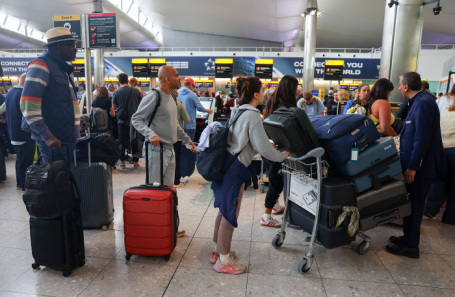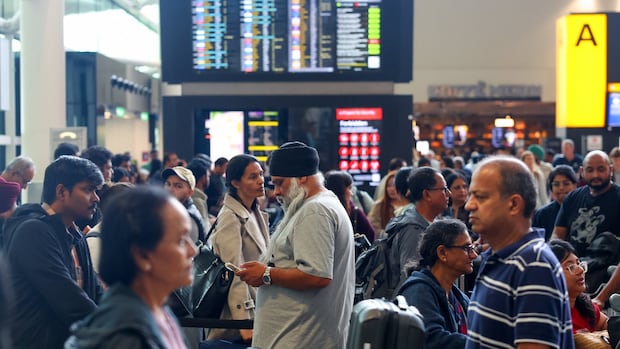The morning commute often brings its share of frustrations, but for thousands across Europe recently, the journey to the skies turned into an unprecedented ordeal. A sophisticated cyberattack, not directly aimed at the majestic terminals of London Heathrow or the bustling gates of Berlin, but at an unseen digital nerve center, sent shockwaves through the continent’s air travel infrastructure, grounding flights and exasperating passengers.

The Invisible Enemy: A Supply Chain Vulnerability Exposed
The culprit wasn`t a direct assault on the airports themselves, but rather a “supply chain attack” targeting Collins Aerospace, a critical third-party service provider. This aerospace and defense giant is responsible for the intricate IT systems that manage everything from passenger check-ins to boarding gate operations at numerous airports worldwide. When their systems faltered, the dominoes began to fall with startling speed.
“An attack on a service provider, on someone who provides a critical service, is a perfectly understandable attack for anyone in information security,” explains Alexey Gorelkin, CEO of Phishman and an expert in information security. “If the structure providing you this service is attacked, your vital business functions naturally stop working.”
This incident underscores a growing vulnerability in our increasingly interconnected world: a single point of failure in a widely used service can trigger widespread disruption, even for entities that maintain robust individual defenses. It`s a stark reminder that a chain is only as strong as its weakest link, or in this case, its most interconnected one. The cloud infrastructure, often touted for its resilience, proved susceptible, allowing malicious actors to cause a cascade of operational breakdowns.
Europe Grounded: A Manual Return to Basics
The impact was immediate and profound. Major aviation hubs felt the brunt:
- London Heathrow Airport, a global gateway, reported a “technical glitch,” clarifying that the disruption stemmed from the attack on Collins Aerospace.
- Brussels Zaventem Airport saw its automated check-in and boarding systems rendered inoperable, forcing staff to revert to manual processing.
- Berlin Brandenburg Airport (BER) opted to disconnect from affected systems for security reasons, leading to lengthy queues, pervasive delays, and flight cancellations.
- Other prominent German airports, including Hamburg and Frankfurt am Main, also reported significant disruptions to their operations.
The digital age, for all its efficiencies, suddenly gave way to a cumbersome past. Passengers, accustomed to scanning QR codes and breezing through automated gates, found themselves in snaking queues, presenting printed tickets and physical proof of purchase to overworked staff. It was a stark, almost ironic, return to the fundamentals of travel in an era defined by speed and seamless digital interaction – a forced detox from automation, if you will.
Beyond the Bytes: The Human Cost and the Blame Game
Beyond the technical jargon, the cyberattack translated into tangible human frustration. Alexander Boyko, Editor-in-Chief of “Berliner Telegraph,” shared his personal experience, having received an advisory to arrive five hours early for an upcoming flight from Berlin. “Many processing and interviews will be done manually,” he noted, highlighting the extraordinary, almost pre-digital, measures required to keep operations moving.
The incident also inevitably sparked discussions about attribution. In Germany, as Boyko wryly points out, “many politicians, whenever something negative happens, even before facts are confirmed, have a template: Russian authorities or Russia.” However, he adds, German residents are often skeptical, having witnessed several such accusations that later proved unfounded. This sentiment offers a glimpse into the complex geopolitical undercurrents that frequently accompany such digital disruptions, sometimes clouding the immediate technical reality.
Boyko further elaborated on Berlin`s airport woes, suggesting that some of the chaos might not solely be attributable to external attacks. “Many scanning devices for electronic tickets don`t work even on ordinary days,” he observed, hinting at underlying infrastructural and organizational challenges that can exacerbate external threats. This local perspective adds a layer of complexity, suggesting that while the cyberattack was the primary catalyst, existing operational vulnerabilities might have amplified its effects, turning a bad situation into a truly arduous one.
A Wake-Up Call for Digital Resilience
As recovery efforts continue, with Collins Aerospace reportedly working diligently to restore full functionality, the episode serves as a potent reminder of our reliance on digital infrastructure and the ever-present threat of cyber warfare. The convenience we often take for granted—from online check-ins to automated boarding—rests upon a foundation of complex, interconnected systems, each a potential target. This incident isn`t just a technical glitch; it`s a profound statement on the fragility of our highly digitalized world.
For airports, airlines, and service providers alike, this event is a crucial wake-up call. It emphasizes the absolute necessity for not just robust individual cybersecurity measures, but also a comprehensive understanding of supply chain risks, resilient backup systems, and well-drilled contingency plans for when the invisible hand of a cyber attacker decides to disrupt the ordinary.
In an age where global connectivity is both a blessing and a curse, ensuring the smooth flow of travel requires constant vigilance and an unwavering commitment to digital security. Otherwise, the skies, usually a symbol of freedom and movement, might find themselves routinely constrained by forces unseen, turning routine journeys into unpredictable sagas.








